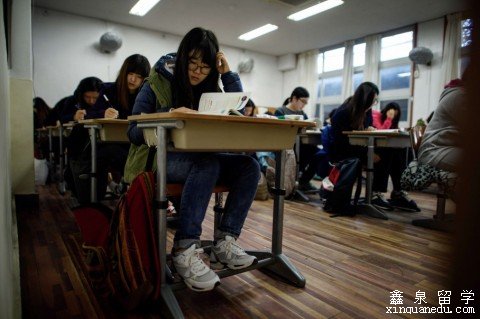导读:在亚洲区10月和11月的亚洲区SAT考试接连被爆出有作弊行为的发生,因而不少同学深受其害,成绩被延迟公布,很多人迫不得已参加12月6日的SAT考试,然而,华盛顿邮报道,12月6日的SAT亚洲考区又传出作弊的消息。
在亚洲区10月和11月的亚洲区SAT考试接连被爆出有作弊行为的发生,因而不少同学深受其害,成绩被延迟公布,很多人迫不得已参加12月6日的SAT考试,然而,华盛顿邮报道,12月6日的SAT亚洲考区又传出作弊的消息。
12月6日,在中国,韩国和其他国家的SAT考卷在早些时候已经在网上流出。很多参加12月6日的考生报告,这次考卷就是2014年3月在美国本土考的SAT考卷。
SAT的出题机构College Board和监考机构ETS,通常使用在美国考过的SAT考卷来当作亚洲区的SAT考卷。在亚洲的SAT考生可以通过种种渠道获得这些考题。更夸张的是,某些考试培训机构会派遣人员去美国本土参加SAT考试,然后记住考题,或者干脆非法的偷偷拍下考卷中的内容。
这些机构收集到这些考试真题后,再以考试真题原题为噱头,办价格不菲的考试培训班招揽考生,以此谋利。还有一些亚洲考生,他们会通过查阅某个论坛。在这个论坛上,很多考生会在考试后写下自己考到的题目。
一个不愿意透露姓名的监考人员在邮件中是这样回复华盛顿邮报的记者的:“学生们告诉我他们用这个网站来猜测之前考试的答案,然后不少小型培训机构会编写一个叫做“机经”的东西。SAT的机经包含了所有之前阅读部分的答案。尽管机经并不是真正的考题,但是看了机经的考生们会记住阅读部分的主要内容和对应题目的答案。在12月6日的考试中,这些考试只需要把对应的答案匹配到相关的阅读篇目里面即可。”
在美国考过的SAT考卷拿出来用到别的考区当考题已经是半公开的事实。College Board此举也颇为无奈,因为开发新的套题的费用实在是过于昂贵。
在今年10月作弊事件传出来之后,做为监考机构的ETS,已经开始了调查,并确认某些考生是作弊了,然后这些考生的成绩就被取消了。
11月,ETS又针对当月的考试做了调查。在这些调查中,被调查的考生成绩被审核,被审核成绩的考生在正常出成绩的日子里得不到成绩。ETS的调查重点放在了中国考生和韩国考生上,但是在诸如日本和泰国考区,ETS也发现了作弊的行为。成绩延迟公布给很多想申请美国大学早申请(Early Decision)的考生们造成了不小的麻烦。
今年传出的作弊事件和去年发生的作弊事件如出一辙。在2013年10月的SAT考试,ETS就因为韩国考区的泄题事件进行了相应调查。更早些时候,College Board因为泄题问题,直接取消了2013年5月所有在韩国考区进行的SAT1和SAT2考试的成绩。那次大规模取消整个考区成绩在历史上也是仅发生过一次。
College Board和ETS已经预计到了12月SAT考试可能出现的作弊行为。在12月考试之前,某不愿透露姓名的监考人员曾经询问过扎克·古德博格关于作弊行为的事。
作为College Board的对外联络负责人,古德博格在邮件里是这么回复这位监考人员的:“College Board和ETS一致致力于给每一位考生创造公平的考试环境。我们在过去的数年里已经在提升考试安全性上做出了很大努力,然而我们深知在这方面应该提升的还有很多。我们会团结一致,积极努力的进行防止作弊行为发生并予以作弊的考生应有的惩罚。我现在还没有更多的关于本周末国际SAT监考考试的信息提供给你。”
古德博格先生,在接受华盛顿邮报关于12月6日作弊行为的采访时候,在邮件里做出了如下回复:“正如你所知,我们正在严肃的处理任何潜在的作弊行为。ETS将会调查所有的事件,以保证考试的公平性和成绩的有效性。
正如我上周邮件里说过的,在过去的2年里,College Board和ETS已经尽了很大的努力去和各种作弊行为进行抗争。除了加强考场里的监考,考题的保密性和成绩的有效性,我们还增加了多种途径去验证考生的真实身份,同时减少了一些区域的考试。加强不少考区的监考管理,并关闭了一些考场。此次此刻,我还无法提供更多的关于本周末国际考场SAT考生的信息给你门。”
公平考试组织的公共教育执行官鲍勃·斯卡夫,宣称SAT考试的持续作弊行为,College Board和ETS机构在这件事上有不可推卸的责任。公平考试组织在最近几个月持续收到了来自很多亚洲考区的考生,教师和监考者的邮件。从这些邮件里,他们已经知道了作弊是如何进行的,斯卡夫先生在邮件里这样说道:
“College Board和ETS在此事上的不作为,使得重复使用的SAT考题在网络上大面积流传。他们的不作为使得亚洲考区的考生可以轻而易举的从过去的考卷中获得重要信息,并用在今后的考试里。”
College Board和ETS的无所作为让我们想起了几年前在美国长滩考区发生的SAT作弊事件。当年,由于迫于学校官员和当地检控官的重重压力,College Board和ETS才展开了一次真正的调查,查到了替考行为,并对此制订了新的政策(检查带有头像的证件)以防止后续事情发生。
斯卡夫先生确认了在中国某些网站上流出的考题和12月6日考题完全一致。
所以那些在SAT考试中涉嫌作弊的考生会有什么样的后果呢?应该是没啥后果。ETS的对外关系负责人汤姆.尤因说,一个被认定作弊的考生成绩将会被取消,但是这个考生所申请的学校却并不会知晓这回事。然后这类考生还会获得重考SAT考试机会。关于这个奇怪的决定,ETS和College Board均没有做出任何回应。
本文所有内容是针对《华盛顿邮报》12月8日的教育板块的编译,内容有删减,全文如下:
For third straight month, cheating alleged on SAT given in Asia
By Valerie Strauss
It happened in October, again in November, and now in December. Test proctors in Asia are reporting that students who took the SAT on Dec. 6 told them that they knew the questions on the exam before it was given, providing them with an unfair advantage over those who did not cheat.
Proctors said that the Dec. 6 SAT given in China, South Korea and other countries was leaked online early, and that after students took the test, they reported that the questions were identical to ones from the March 2014 SAT given in the United States.
It is commonplace for the College Board, which owns the SAT, and the Educational Testing Service, which administers the test for the College Board, to use versions of the test in Asia that were previously given in the United States. Students in Asia are able to obtain the test questions in advance through a multi-step process that you can read about here. In some cases, test preparation entities get the questions in advance by having compatriots take the SAT in the United States and memorize or illegally take photos of the exams — and charge big fees to students. In other cases, Asian students who know the test has already been given in the United States check on a Web site called College Confidential on which students sometimes write about SAT questions after taking the exam. Then, as one proctor, who asked to remain anonymous, explained in an e-mail:
Students told me that they used College Confidential to discern the answers to previous exams and many private tutors and public testing centers compile what is called a “key king,” or a booklet containing all of the answers to the critical reading sections of previous exams. When a key king is compiled from college confidential the students do not have the actual test paper, but they know the answers and the subject of the critical reading sections. Students who memorized the key king reported that they recognized the critical reading sections on Saturday’s SAT I exam and were able to match the questions on the exams with the key king answers they had memorized.
The SAT is owned by the College Board, which contracts with the Educational Testing Service to administer the exam around the world. Old versions of the SAT given in the United States are used overseas because the expense of designing new tests is high, test experts say. After allegations of cheating on the October 2014 administration of the SAT in several Asian countries, the ETS opened an investigation and determined that some students had in fact cheated. Their scores were cancelled. Another probe was opened in November after cheating allegations were made following the administration of the exam then. During the probes, students’ scores are withheld, making it difficult for a number of students who wanted to use the scores to apply to U.S. colleges early admission. The ETS probes have focused on allegations of cheating in South Korea and China but test proctors in other places, including Japan and Thailand, have alleged instances of cheating as well.
This year’s cheating troubles follow similar ones last year. In 2013, the October administration of the SAT led to allegations in South Korea that questions from earlier tests were obtained by “cram schools” and given to students before they took the exam. And the College Board canceled the May 2013 administration of the SAT and SAT Subject Tests throughout South Korea because of a leak of test questions — the first time the test had been canceled in an entire country.
The College Board and ETS were aware of concerns that there would be cheating on the Dec. 6 administration of the exam in Asia. Shortly before the December test, I asked them about the cheating fears and Zach Goldberg, director of external communications of the College Board, wrote in an e-mail:
The College Board and ETS are committed to ensuring a fair testing environment for students. We have made great strides in improving our security measures over the past several years, yet we know more can still be done. Together we are actively working to find additional ways to prevent cheating and to ensure that those individuals who breach security protocols are held accountable.
We do not have any additional information to provide about this weekend’s international SAT administration.
Goldberg, asked Monday about the cheating allegations for the Dec. 6 administration of the SAT, said in an e-mail:
As you know, we take seriously any reported violations of our test administration and security policies. ETS investigates any and all allegations of misconduct reported to them and will take the necessary actions to ensure test security and the validity of the scores, including cancelling scores, if necessary.
As I emailed last week, over the past two years, the College Board and ETS have taken significant steps to combat a wide range of cheating. In addition to on-site investigations, to further safeguard the security of the exams and the validity of the scores, we have increased the ways in which we verify a test-taker’s identity, reduced the number of administrations available in certain areas, enhanced on-site security measures in some test centers and closed others entirely.
We cannot provide additional information about this weekend’s international SAT administration at this time.
Bob Schaeffer, public education director of the nonprofit National Center for Fair & Open Testing, known as FairTest, said the continuing cheating on the SAT and the inability or refusal of the College Board and the ETS to find ways to stop it are inexcusable. FairTest has for months received a number of e-mails from students, tutors and proctors from around Asia explaining how cheating is conducted. He said in an e-mail:
The failure of the College Board and ETS to halt their practice of reusing previously administered SAT exams in Asia in the face of overwhelming evidence that the contents were widely circulated in advance amounts to gross negligence ethically if not legally. Their continued irresponsibility guarantees that some test-takers in Asia had a huge advantage from prior knowledge of test items.
The test-makers’ (lack of) response is all too similar to the disregard they initially paid to claims of SAT cheating on Long Island several years ago. It was only when school officials and the local District Attorney forced the issue that the College Board and ETS conducted a real investigation, exposed an impersonation ring, and developed new policies to stop that particular form of cheating (i.e. photo identification)
Schaeffer confirmed that tests leaked recently on Chinese Web sites were identical to the tests students said they took Dec. 6.
So what happens to those students found to have cheated in one of these probes? Not much. As I reported in a previous post, Tom Ewing, director of external affairs at the Educational Testing Service, said in an e-mail that a confirmed cheater’s scores are cancelled but that the schools to which he or she is applying are not notified. Furthermore, they are permitted to take the SAT again. Why? That’s a question the ETS and the College Board haven’t answered yet.
Meanwhile, Chinese authorities have apprehended a few thousand students for cheating on a national pharmacy exam, according to state television as reported by the South Morning China Post. Some 2,440 students were caught cheating on the Licensed Pharmacy Test in Xian, capital of Shaanxi Province. The students were caught when Shaanxi Radio Monitoring Station discovered radio signals on an illegal channel during the testing that were determined to be part of a sophisticated way of cheating.
鑫泉出国全国品牌留学机构,提供最新留学资讯,为您成功留学不遗余力!如有疑问欢迎拨打以下咨询热线:
资讯来源:来源网络
责任编辑:admin





